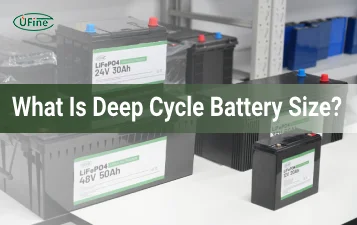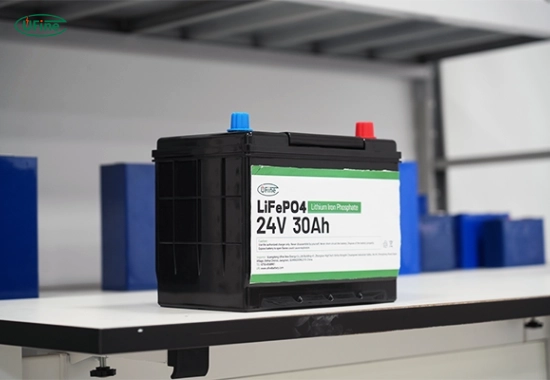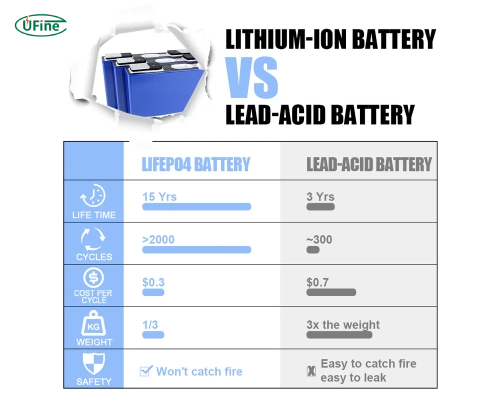
- Part 1. What is a lithium 24V battery?
- Part 2. Why are lithium 24V batteries better for golf carts?
- Part 3. How does a lithium 24V battery work?
- Part 4. The advantages of lithium 24V batteries over lead-acid batteries
- Part 5. Are lithium 24V batteries worth the investment?
- Part 6. How to choose the right lithium 24V battery for your golf cart?
- Part 7. How long does a lithium 24V battery last?
- Part 8. Can you replace lead-acid batteries with lithium 24V batteries in a golf cart?
- Part 9. Maintenance tips for lithium 24V batteries
- Part 10. FAQs
Golf carts have come a long way from their traditional lead-acid powered systems. Lithium 24V batteries have recently emerged as the new favorite for powering golf carts. These batteries enhance performance and offer a range of benefits that make them stand out from older technologies. But what exactly makes lithium 24V batteries the new standard for golf carts? In this article, we’ll explore the reasons behind their growing popularity, compare them with traditional battery types, and answer some of the most frequently asked questions.
Part 1. What is a lithium 24V battery?
A lithium 24V battery is rechargeable and uses lithium-ion technology to store energy. The “24V” refers to the voltage output, a common standard for powering golf carts. These batteries comprise multiple lithium-ion cells connected in series to provide the required voltage. Lithium batteries are lighter, more efficient, and longer-lasting than lead-acid batteries, making them ideal for modern golf carts.
Part 2. Why are lithium 24V batteries better for golf carts?
Suppose you’ve wondered why lithium 24V batteries replace traditional lead-acid batteries in golf carts. In that case, the answer lies in their superior performance and durability. Here are some key reasons:
1. Lightweight design
Lithium batteries are significantly lighter than lead-acid batteries. This reduces the golf cart’s overall weight, improving its speed, handling, and energy efficiency.
2. Longer lifespan
One of the standout features of lithium batteries is their lifespan. While lead-acid batteries typically last 2-3 years, lithium batteries can last up to 10 years or more with proper maintenance.
3. Faster charging
Lithium 24V batteries charge much faster than their lead-acid counterparts. You can often achieve a full charge in just a few hours, compared to the 8-12 hours required for lead-acid batteries.
4. Consistent power output
Lithium batteries maintain a consistent voltage output throughout their discharge cycle. This means your golf cart will perform at peak levels until the battery is nearly depleted, unlike lead-acid batteries that gradually lose power as they discharge.
5. Low maintenance
Lithium batteries are virtually maintenance-free. There’s no need to regularly check water levels or clean terminals, a common requirement for lead-acid batteries.
Part 3. How does a lithium 24V battery work?
Lithium-ion batteries move lithium ions between the anode and cathode during charge and discharge cycles. When the battery charges, the ions move from the cathode to the anode. When discharging, the ions flow back to the cathode, releasing energy. This efficient chemical reaction is what makes lithium batteries so reliable and robust.
Part 4. The advantages of lithium 24V batteries over lead-acid batteries
Cost-effectiveness over time
Although lithium batteries have a higher upfront cost, their long lifespan and low maintenance requirements make them more cost-effective in the long run.
Eco-friendliness
Lithium batteries are more environmentally friendly than lead-acid batteries. They have a lower carbon footprint, are more energy-efficient, and are easier to recycle.
Improved safety
Modern lithium batteries come with built-in Battery Management Systems (BMS) that help prevent overcharging, overheating, and deep discharging, making them safer than traditional batteries.
What’s the Difference Between 48v and 51.2v Golf Cart Batteries?
Part 5. Are lithium 24V batteries worth the investment?
Absolutely. While the initial cost of a lithium 24V battery might be higher than a lead-acid battery, the benefits far outweigh the cost. With a longer lifespan, reduced maintenance, and better performance, these batteries provide excellent value for money.
Part 6. How to choose the right lithium 24V battery for your golf cart?
When selecting a lithium 24V battery for your golf cart, consider the following factors:
- Capacity (Ah): Ensure the battery’s amp-hour rating matches your golf cart’s energy requirements.
- Brand reputation: Choose a reputable brand with a warranty and excellent customer support.
- Battery Management System (BMS): Look for batteries with a built-in BMS for added safety.
- Compatibility: Ensure the battery matches your golf cart’s voltage and system requirements.
Part 7. How long does a lithium 24V battery last?
A high-quality lithium 24V battery can last 8 to 15 years, depending on usage and maintenance. This is significantly longer than lead-acid batteries, which typically last only 2-3 years.
Part 8. Can you replace lead-acid batteries with lithium 24V batteries in a golf cart?
Yes, most golf carts can replace lead-acid batteries with lithium 24V batteries. However, you may need to make some adjustments, such as upgrading the charger or reconfiguring the battery compartment to accommodate the new battery.
Part 9. Maintenance tips for lithium 24V batteries
While lithium batteries require minimal maintenance, following these tips can help maximize their lifespan:
- Avoid deep discharges: Avoid letting the battery discharge below 20%.
- Store properly: If you’re not using the battery for an extended period, store it at around 50% charge in a cool, dry place.
- Use the correct charger: Always use a charger designed specifically for lithium batteries.
- Monitor the battery: Keep an eye on the battery’s health using the built-in Battery Management System (BMS).
Part 10. FAQs
-
How long does it take to charge a lithium 24V battery?
Lithium 24V batteries typically charge in 3 to 5 hours, depending on the charger and battery capacity. -
Are lithium batteries safe for golf carts?
Lithium batteries are safe for golf carts, especially those with a built-in Battery Management System (BMS) to prevent overheating and overcharging. -
Can lithium batteries be recycled?
Yes, lithium batteries can be recycled. Always dispose of them at a certified recycling facility to reduce environmental impact. -
Do lithium 24V batteries lose capacity over time?
Like all batteries, lithium 24V batteries gradually lose capacity over time. However, their degradation rate is much slower than that of lead-acid batteries. -
Can I use a regular charger for lithium 24V batteries?
No, you should use a charger designed specifically for lithium batteries. Using the wrong charger can damage the battery and reduce its lifespan.
Related Tags:
More Articles

Understanding Deep Cycle Battery Size Options
Learn deep cycle battery sizes, BCI group standards, capacity matching, battery types, and key questions for RV, marine, solar, and backup power systems.
Why You Need a Lithium Battery Heater for Cold Weather Performance and Longevity
Learn how heated lithium batteries and lithium battery heaters ensure safe charging, reliable performance, and longer lifespan in cold climates.
Top 10 3.7V 18650 Battery Recommendations
Top 10 3.7V 18650 battery recommendations with specs, comparisons, applications, and tips to choose the right 18650 rechargeable battery.
What to Know Before Buying a Riding Mower Battery
Discover the best riding mower battery for your lawn. Compare AGM, Lithium, and Lead-Acid types by weight, capacity, lifespan & price.
Lithium Battery Repair: How to Fix & Restore Your Lithium‑Ion Battery
Learn how to repair lithium-ion batteries safely with practical tips, BMS tricks, and DIY cell balancing for longer battery life.




